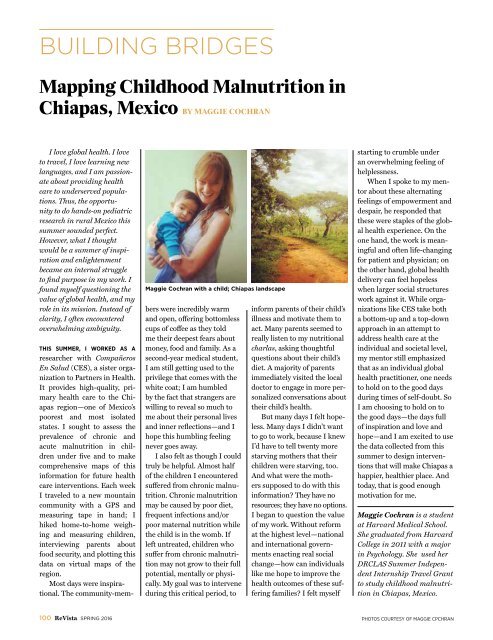EL SALVADOR
8clowSgZh
8clowSgZh
You also want an ePaper? Increase the reach of your titles
YUMPU automatically turns print PDFs into web optimized ePapers that Google loves.
BUILDING BRIDGES<br />
Mapping Childhood Malnutrition in<br />
Chiapas, Mexico BY MAGGIE COCHRAN<br />
I love global health. I love<br />
to travel, I love learning new<br />
languages, and I am passionate<br />
about providing health<br />
care to underserved populations.<br />
Thus, the opportunity<br />
to do hands-on pediatric<br />
research in rural Mexico this<br />
summer sounded perfect.<br />
However, what I thought<br />
would be a summer of inspiration<br />
and enlightenment<br />
became an internal struggle<br />
to find purpose in my work. I<br />
found myself questioning the<br />
value of global health, and my<br />
role in its mission. Instead of<br />
clarity, I often encountered<br />
overwhelming ambiguity.<br />
Maggie Cochran with a child; Chiapas landscape<br />
THIS SUMMER, I WORKED AS A<br />
researcher with Compañeros<br />
En Salud (CES), a sister organization<br />
to Partners in Health.<br />
It provides high-quality, primary<br />
health care to the Chiapas<br />
region—one of Mexico’s<br />
poorest and most isolated<br />
states. I sought to assess the<br />
prevalence of chronic and<br />
acute malnutrition in children<br />
under five and to make<br />
comprehensive maps of this<br />
information for future health<br />
care interventions. Each week<br />
I traveled to a new mountain<br />
community with a GPS and<br />
measuring tape in hand; I<br />
hiked home-to-home weighing<br />
and measuring children,<br />
interviewing parents about<br />
food security, and plotting this<br />
data on virtual maps of the<br />
region.<br />
Most days were inspirational.<br />
The community-members<br />
were incredibly warm<br />
and open, offering bottomless<br />
cups of coffee as they told<br />
me their deepest fears about<br />
money, food and family. As a<br />
second-year medical student,<br />
I am still getting used to the<br />
privilege that comes with the<br />
white coat; I am humbled<br />
by the fact that strangers are<br />
willing to reveal so much to<br />
me about their personal lives<br />
and inner reflections—and I<br />
hope this humbling feeling<br />
never goes away.<br />
I also felt as though I could<br />
truly be helpful. Almost half<br />
of the children I encountered<br />
suffered from chronic malnutrition.<br />
Chronic malnutrition<br />
may be caused by poor diet,<br />
frequent infections and/or<br />
poor maternal nutrition while<br />
the child is in the womb. If<br />
left untreated, children who<br />
suffer from chronic malnutrition<br />
may not grow to their full<br />
potential, mentally or physically.<br />
My goal was to intervene<br />
during this critical period, to<br />
inform parents of their child’s<br />
illness and motivate them to<br />
act. Many parents seemed to<br />
really listen to my nutritional<br />
charlas, asking thoughtful<br />
questions about their child’s<br />
diet. A majority of parents<br />
immediately visited the local<br />
doctor to engage in more personalized<br />
conversations about<br />
their child’s health.<br />
But many days I felt hopeless.<br />
Many days I didn’t want<br />
to go to work, because I knew<br />
I’d have to tell twenty more<br />
starving mothers that their<br />
children were starving, too.<br />
And what were the mothers<br />
supposed to do with this<br />
information? They have no<br />
resources; they have no options.<br />
I began to question the value<br />
of my work. Without reform<br />
at the highest level—national<br />
and international governments<br />
enacting real social<br />
change—how can individuals<br />
like me hope to improve the<br />
health outcomes of these suffering<br />
families? I felt myself<br />
starting to crumble under<br />
an overwhelming feeling of<br />
helplessness.<br />
When I spoke to my mentor<br />
about these alternating<br />
feelings of empowerment and<br />
despair, he responded that<br />
these were staples of the global<br />
health experience. On the<br />
one hand, the work is meaningful<br />
and often life-changing<br />
for patient and physician; on<br />
the other hand, global health<br />
delivery can feel hopeless<br />
when larger social structures<br />
work against it. While organizations<br />
like CES take both<br />
a bottom-up and a top-down<br />
approach in an attempt to<br />
address health care at the<br />
individual and societal level,<br />
my mentor still emphasized<br />
that as an individual global<br />
health practitioner, one needs<br />
to hold on to the good days<br />
during times of self-doubt. So<br />
I am choosing to hold on to<br />
the good days—the days full<br />
of inspiration and love and<br />
hope—and I am excited to use<br />
the data collected from this<br />
summer to design interventions<br />
that will make Chiapas a<br />
happier, healthier place. And<br />
today, that is good enough<br />
motivation for me.<br />
Maggie Cochran is a student<br />
at Harvard Medical School.<br />
She graduated from Harvard<br />
College in 2011 with a major<br />
in Psychology. She used her<br />
DRCLAS Summer Independent<br />
Internship Travel Grant<br />
to study childhood malnutrition<br />
in Chiapas, Mexico.<br />
100 ReVista SPRING 2016 PHOTOS COURTESY OF MAGGIE CPCHRAN


